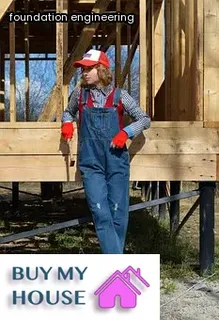It is important to identify and address foundation problems in your home as soon as possible to avoid further damage. One way to identify foundation damage is to look for signs of cracking or crumbling in the walls.
These can be seen both inside and outside of the home, usually near windows, door frames, and baseboards. Additionally, doors or windows that do not open or close properly might indicate a foundation issue.
You may also notice gaps between walls and floors, sticking windows or doors, and sloping floors which could all be caused by a damaged foundation. If you think you have any of these signs of foundation damage, it is important to contact a professional who can assess the situation further and determine the best course of action for resolution.

It is important to understand the potential causes of foundation issues in buildings in order to identify and resolve them. One of the most common causes of foundation problems is soil movement, which can occur due to changes in moisture content, erosion, and even building maintenance activities such as poor drainage systems or grading issues.
Poor construction practices can also have an effect, including inadequate footings or a lack of proper reinforcement bars. Additionally, expansive clay soil can cause significant damage due to its ability to swell when it becomes wet.
Lastly, seismic activity or nearby excavation work can cause shifts in the ground that affect the stability of a building’s foundation. Identifying these causes is essential for resolving any foundation problems in your home.
Poor drainage can have a significant impact on the foundations of a home. When water accumulates around the base of your home, it can cause the soil to become soft and erode away.
This erosion can lead to foundational cracks and settling, which can cause serious structural damage and even render a house uninhabitable. To prevent this from happening, it's important to identify any drainage problems and take steps to resolve them.
Ensuring proper grading around your foundation, installing perimeter drains or french drains, or redirecting downspouts away from the foundation are all effective strategies for preventing poor drainage from affecting your foundation.

When it comes to diagnosing foundation problems in your home, one of the most effective methods is simply through visual cues. Start by visually inspecting the exterior of your home for cracks that may indicate a structural issue.
These can appear on the walls, around windows or doors, and even in the foundation itself. It's also important to check for water pooling around your house or near the foundation as this can be a sign of foundational instability.
If you notice any bulging walls or floors that are uneven, these could be signs that your foundation is shifting or settling and needs attention. Additionally, take a look at any visible pipes running through your basement, attic, or crawl spaces as these may be leaking and causing further damage to the structure of your home.
Taking all these visual indicators into account can help you make an educated decision about whether there is an underlying problem with your foundation that needs to be resolved.
It is important to be aware of the common signs of foundation damage to ensure that you can identify problems early and take steps to resolve them. Cracks in walls, floors, or ceilings can signal a problem with the foundation; these cracks may appear in straight lines, around doors or windows, on the exterior walls, or near chimneys.
Uneven or sloping floors can also indicate an issue with the foundation; this may be seen as a dip or rise in certain sections of the floor. Gaps between wall and ceiling fixtures are another warning sign as they could mean that the house has shifted due to underlying foundation issues.
Doors that stick when opened or closed and windows that don’t open easily could also point to foundation damage. Additionally, water pooling around your home’s perimeter could suggest that there is a problem with drainage which could potentially lead to more serious damage if not addressed.
Paying attention to these common signs of foundation damage can help you protect your home from further issues down the road.

Controlling weeds around your home foundation is essential for keeping it healthy and free of problems. Weeds can wreak havoc on foundations and spread quickly, so it’s important to identify and remove any existing weeds as soon as possible.
Weed control methods include using a pre-emergent herbicide to prevent weed seeds from germinating, or pulling out existing weeds by hand. To ensure the health of your home’s foundation, it is important to follow up with regular inspections of the area and promptly address any new weed issues that arise.
Additionally, you should consider implementing preventative measures such as maintaining a two-foot buffer zone between landscaping plants and your house foundation or installing plastic barriers in areas where weeds are commonly found. Taking these steps will help keep your home foundation safe from weed-related problems.
The relationship between soil and foundation stability is of paramount importance when it comes to identifying and resolving foundation problems in your home. Knowing the type of soil that surrounds your house, as well as its composition and capacity to support the building's weight, will help you determine if there are any potential issues with the residence's foundation.
Additionally, understanding how moisture levels affect the soil's bearing capacity is critical in assessing the stability of your home's base. An excessive amount of water can cause soils to become saturated, causing shifts or settling that can lead to foundation cracks or other structural damage.
Furthermore, if a structure sits atop expansive clay, which swells and contracts with changes in water content, this can result in further instability and damage. By understanding these factors and how they relate to foundation stability, you can better identify and resolve any issues with your home’s base.

When it comes to foundation issues, one of the most important signs to look out for is floor levelness. If certain parts of the floor feel higher or lower than others, it could be an indication of a foundation issue.
To check for floor levelness, use a four-foot level and place it in different areas across the floor. If you notice any sections where the bubble on the level doesn’t align with the center line, this means that area is not level and may require further inspection.
You can also use a carpenter’s square to measure corners and see if they are still aligned or if there is a noticeable shift. If either of these tools reveals that your floors are not level, it’s time to contact a professional to inspect your foundation and determine whether repairs are needed.
Exterior wall cracks can be an indicator that your home's foundation is suffering from damage. While some cracking may occur naturally over time due to settling, if you notice any large or unusual cracks it may be a sign of a more serious problem.
It is important to inspect the walls of your home carefully for signs of foundation damage, as it can often be difficult to identify until it has become more serious. To identify potential problems with the foundation, look for windows and doors that don’t close properly, diagonal cracking in brickwork or stonework along the exterior walls, stair step cracks in masonry joint patterns, gaps between window frames and/or floors, and water accumulation near the foundation.
If any of these signs are present in your home, it is critical to hire a professional inspector or engineer to evaluate the structure and resolve any issues before they worsen.

Windows and doors are the most common indicators of foundation problems in a home. Inspecting them for signs of damage, such as warping, cracking, or misalignment, can alert you to potential issues and help you identify solutions.
Check for loose frames or sagging window sills, as well as any gaps around doors and windows that may be caused by shifting walls. If you notice any of these signs, it is important to take action immediately to prevent further damage from occurring.
Also, look out for signs of water infiltration through the frame or cracks in the wall near the window or door. Repairing these issues quickly can save time and money in the long run.
Properly maintained windows and doors will not only keep your home safe but also add value to your property.
When assessing a crawl space for potential moisture issues, it is important to look out for certain indicators that can signal the presence of water damage or even major foundation problems. Visual inspection is key as one should look for any signs of wet spots, mold growth, and existing water damage to the floor joists or subflooring.
Additionally, you should check for any musty smells as they can be indicative of rot and mildew formation. Other warning signs include rusting nails, peeling paint, and discolored patches on walls and floors.
If you detect any of these matters in your crawl space, it is best to take immediate action as it could be an indication of serious underlying issues with your home’s foundation. Furthermore, hiring a professional to inspect your crawl space can help identify more subtle signs of moisture buildup that may otherwise go unnoticed by the untrained eye.
Taking these steps can help ensure that you will be able to properly identify and resolve any foundation problems in your home before they lead to more costly repairs down the line.

Drywall cracks can be an indication of foundation problems in your home. As the foundation shifts and settles, it can cause the walls to separate, resulting in visible drywall cracks.
It is important to inspect these areas regularly and take action if you notice cracks suddenly appearing or getting bigger. Look for any signs of water damage as well that could be caused by shifting due to foundational issues.
If you see signs of staining, bubbling paint, or rusting nails then this could signify a more serious problem. To determine the severity of the issue, use a level tool to check for levelness in the area where you have observed the crack.
If there is a large difference between one side and another then this could indicate a structural problem with your foundation that needs to be addressed immediately.
Warped siding is one of the most noticeable visual clues that your home may have foundation issues. If the siding on your home is warping, bending, or buckling in any way, it could be a sign that there are bigger problems lurking beneath the surface.
This can be especially true if other nearby homes have similar features and materials but do not display any signs of warped siding. Warped siding can also be caused by factors other than foundation issues, such as poor installation or water damage, so it’s important to assess all possible causes before jumping to conclusions.
If you suspect that warped siding may be indicative of a foundation problem, contact an expert immediately in order to identify and resolve the issue before it worsens and becomes more costly to repair.

When investigating ground sinking around the house, it is important to analyze bouncing floors for warning signs of structural deterioration. Floors that are uneven can be a sign of possible foundation damage, so it is important to investigate further if this is the case.
There are several strategies that can be used to fix serious foundation problems in homes, such as strengthening existing foundations, underpinning them with concrete piers or installing helical piles. It can also be necessary to repair doors and windows that are sticking or not latching due to foundation issues.
Identifying and resolving foundation problems in your home quickly and efficiently can help prevent further damage and ensure the structural integrity of your property.
When it comes to buying a house, foundation problems can be an intimidating problem to face. But before you write off the house altogether, it’s important to consider the potential costs and outcomes of identifying and resolving foundation issues in your home.
Foundation problems can range from minor repairs to complete replacement, so it’s important to accurately assess the severity of the issue before making a decision. Hiring a professional structural engineer is essential for properly diagnosing any foundation issue, as they will be able to identify the cause of any cracks or shifts in your home's structure and recommend solutions for repair or replacement.
In some cases, hiring a professional may not be necessary if the foundation problem is minor—but this should only be done after consulting with an expert. When deciding whether or not it’s worth buying a house with foundation problems, consider factors such as cost of repair versus value of the house, availability of contractors in your area who specialize in foundation repairs, and ultimately how comfortable you are living in a home with unresolved structural issues.

Yes, house foundation issues can be fixed. The first step in identifying and resolving any foundation problem is to inspect the home for signs of damage.
Cracking walls and floors, sticking doors and windows, uneven floors, and water seepage are all indicators of foundation problems that require attention. Once these issues have been identified, homeowners should consult with a professional to assess the severity of the issue and determine the best course of action.
Depending on the type of foundation issue present, repair options may include underpinning, structural repairs, and waterproofing treatments. If you believe your home has a foundation issue that needs addressing, it is important to act quickly in order to prevent further damage or costly repairs in the future.
The answer to this question is a resounding yes. Foundation problems in your home can be identified and resolved quickly and efficiently if you know what signs to look for.
Cracks in exterior walls, sloping floors, and doors or windows that are difficult to open or close are all indicators of foundation issues. It’s important to address these problems as soon as possible, since any further damage could lead to more costly repairs down the line.
With proper inspection and repair, your home should remain safe for you and your family. Professional contractors can help you identify the source of the problem and provide solutions that will ensure the safety of your residence for years to come.
Whether it’s a sunken slab, deteriorating walls, or foundation shifting, there are professional services available that can help you make the necessary repairs. By taking the time to identify and resolve foundation problems in your home early on, you can save yourself a lot of money in repairs down the road while also protecting yourself from potential danger.
Knowing when to walk away from foundation problems in your home is a critical step in protecting the integrity of your property and avoiding costly repairs. Determining whether the problem is minor or major can be difficult, so it is important to assess the issue carefully before taking further action. In some cases, it may be best to simply walk away from the problem entirely.
If you notice large cracks in your foundation walls or floors that are wider than 1/8 inch and stair-step cracking along brick walls, these are signs that the settlement of your foundation has likely reached an irreversible state. If you see these signs, it’s time to call in an expert who can help diagnose the issue and recommend a course of action. In some cases, they may advise abandoning further repairs and opting for a complete replacement of the foundation instead.
In other instances, the damage may be confined to one area or section of your house and can be repaired with minimal disruption to its structural integrity. If so, then repairing the area may be worth pursuing as long as you have a professional assess what level of repair is necessary. However, if any part of your foundation appears severely damaged with no hope for repair or stabilization, then walking away from it would be best for both safety and financial reasons.
Ultimately, knowing when to walk away from foundation problems in your home is a tricky decision that requires careful assessment and evaluation by a qualified professional. By following this advice, you can ensure that you make an informed decision about how best to take care of any issues with your home’s foundation without putting yourself at risk financially or structurally.
A: Yes, in the United States, homeowners should be aware of local building codes and zoning regulations regarding foundation repairs and construction standards. Additionally, many states have specific laws related to foundation problems, such as repair requirements and liability for damages caused by faulty foundations.